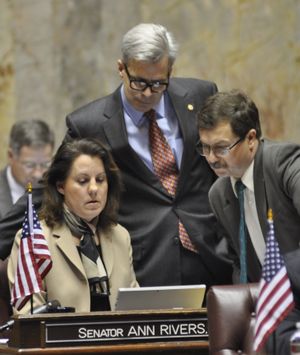Senate passes medical marijuana changes
OLYMPIA – Major changes to the state's medical marijuana passed the Senate after sponsors beat back a challenge to requirements for a patient database and a plea to let recreational users grow their own.
Medical marijuana stores would be regulated by the Liquor Control Board, which currently licenses recreational pot growers and sellers, under a bill drafted by La Center Republican Ann Rivers and Raymond Democrat Brian Hatfield. The agency would expand the number of licensed stores to meet the medical market, and current recreational marijuana stores could get an endorsement to sell special medical strains, which patients could buy without paying some of the heavy taxes on recreational pot.
The number of plants a patient could grow at home would be cut from 15 to six in most cases, although the number could go up with a doctor’s recommendation. Collective gardens, which some people blame for the explosion in unregulated dispensaries, would be severely restricted.
Reconciling the state's different recreational and medical marijuana laws is one of the major tasks in this year's Legislature, and Friday’s vote was the first on the floor of either chamber.
It passed on a bipartisan count of 36-11. But before that vote took opponents tried unsuccessfully to strip a requirement that all patients must be entered in a database maintained by the state Department of Health, and add a provision that recreational users could grow up to six plants at home, just like medical for their private use.
Current medical marijuana laws allow individuals to grow some plants for themselves, or as part of a co-operative. Recreational marijuana laws, however, do not allow for individuals to grow any plants at home, and instead restrict that use of the drug to tightly regulated production and sales overseen by the Liquor Control Board.
Sen. Jeanne Kohl-Wells, D-Seattle, said other states that have legalized recreational marijuana allow for a few plants to be grown at home, and allowing medical cooperatives to continue banning individual recreational growers “makes no sense.”
“We allow home-brewing for beer,” Kohl-Wells said.
But Rivers, R-La Center, said the initiative that voters approved for recreational marijuana in 2012 banned home grows. Legislators in Colorado, which also legalized recreational use, have told her they believed that state was wrong to allow people to grow marijuana at home, she added: “They said ‘It is a genie you can't get back in the bottle.’”
She also defended the database for medical marijuana users, saying other states have some system for registering those patients.
Kohl-Wells got support from Sen. Brian Dansel, R-Republican in the fight to replace the database with a state-issued authorization card: “I think registries are a bad thing," Dansel said, adding that registries for some over-the-counter drugs are different because those drugs can be more harmful, but they aren't against federal law.
An amendment to replace the database with Department of Health issued authorization cards failed on a 21-26 vote, and several other amendments were defeated on voice votes.

